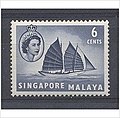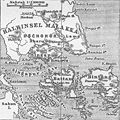Portal:Singapore
 Map of Singapore Singapore, officially the Republic of Singapore, is an island country and city-state in maritime Southeast Asia. The country's territory comprises one main island, 63 satellite islands and islets, and one outlying islet. It is about one degree of latitude (137 kilometres or 85 miles) north of the equator, off the southern tip of the Malay Peninsula, bordering the Strait of Malacca to the west, the Singapore Strait to the south along with the Riau Islands in Indonesia, the South China Sea to the east, and the Straits of Johor along with the State of Johor in Malaysia to the north.
Singapore's history dates back at least eight hundred years, having been a maritime emporium known as Temasek and subsequently a major constituent part of several successive thalassocratic empires. Its contemporary era began in 1819, when Stamford Raffles established Singapore as an entrepôt trading post of the British Empire. In 1867, Singapore came under the direct control of Britain as part of the Straits Settlements. During World War II, Singapore was occupied by Japan in 1942 and returned to British control as a separate Crown colony following Japan's surrender in 1945. Singapore gained self-governance in 1959 and, in 1963, became part of the new federation of Malaysia, alongside Malaya, North Borneo, and Sarawak. Ideological differences led to Singapore's expulsion from the federation two years later; Singapore became an independent sovereign country in 1965. After early years of turbulence and despite lacking natural resources and a hinterland, the nation rapidly developed to become one of the Four Asian Tigers. As a highly developed country, it has one of the highest GDP per capita (PPP) in the world. It is also identified as a tax haven. Singapore is the only country in Asia with a AAA sovereign credit rating from all major rating agencies. It is a major aviation, financial, and maritime shipping hub and has consistently been ranked as one of the most expensive cities to live in for expatriates and foreign workers. Singapore ranks highly in key social indicators: education, healthcare, quality of life, personal safety, infrastructure, and housing, with a home-ownership rate of 88 percent. Singaporeans enjoy one of the longest life expectancies, fastest Internet connection speeds, lowest infant mortality rates, and lowest levels of corruption in the world. It has the third highest population density of any country in the world, although there are numerous green and recreational spaces as a result of urban planning. With a multicultural population and in recognition of the cultural identities of the major ethnic groups within the nation, Singapore has four official languages: English, Malay, Mandarin, and Tamil. English is the common language, with exclusive use in numerous public services. Multi-racialism is enshrined in the constitution and continues to shape national policies in education, housing, and politics. Singapore is a parliamentary republic in the Westminster tradition of unicameral parliamentary government, and its legal system is based on common law. While the country is de jure a multi-party democracy with free elections, the government under the People's Action Party (PAP) wields widespread control and political dominance. The PAP has governed the country continuously since full internal self-government was achieved in 1959, and holds a supermajority in Parliament. One of the five founding members of ASEAN, Singapore is also the headquarters of the Asia-Pacific Economic Cooperation Secretariat, the Pacific Economic Cooperation Council Secretariat, and is the host city of many international conferences and events. Singapore is also a member of the United Nations, the World Trade Organization, the East Asia Summit, the Non-Aligned Movement, and the Commonwealth of Nations. (Full article...)Selected article -The Bombing of Singapore (1944–1945) was a military campaign conducted by the Allied air forces during World War II. United States Army Air Forces (USAAF) long-range bomber units conducted 11 air raids on Japanese-occupied Singapore between November 1944 and March 1945. Most of these raids targeted the island's naval base and dockyard facilities, and minelaying missions were conducted in nearby waters. After the American bombers were redeployed, the British Royal Air Force assumed responsibility for minelaying operations near Singapore and these continued until 24 May 1945. The raids had mixed results. While significant damage was inflicted on Singapore's important naval base and commercial port, some raids on these targets were not successful and other attacks on oil storage facilities on islands near Singapore were ineffective. The minelaying campaign disrupted Japanese shipping in the Singapore area and resulted in the loss of three vessels and damage to a further ten, but was not decisive. The Allied air attacks were successful in raising the morale of Singapore's civilian population, who believed that the raids marked the impending liberation of the city. The overall number of civilian casualties from the bombings was low, though civilian workers were killed during attacks on military facilities; one attack rendered hundreds of people homeless. (Full article...) Selected pictureThe Tanglin Police Division (or 'E' Division, Chinese: 东陵警区) is a police division of the Singapore Police Force. It manages a varied, highly urbanised area of central Singapore, which includes the public housing towns of Bishan, Toa Payoh and parts of Kallang, large areas of private housing areas such as those in Bukit Timah and Novena, as well as key commercial areas such as Orchard Road and Clarke Quay. Read more... General imagesThe following are images from various Singapore-related articles on Wikipedia.
Selected biography -Feng Tianwei PJG (Chinese: 冯天薇; pinyin: Féng Tiānwēi, pronounced [fə̌ŋ tjɛ́nwéi]; born 31 August 1986) is a Singaporean retired table tennis player. Born in China, she permanently moved to Singapore in March 2007 at the age of 20 under the Foreign Sports Talent Scheme and commenced her international career in competitive table tennis the following month. Feng represented Singapore for the first time in the Olympic Games at the 2008 Summer Olympics in Beijing. On 15 August 2008, the Singapore team comprising Feng and her teammates Li Jiawei and Wang Yuegu defeated South Korea 3–2 in the semifinals. The team lost to China in the final, obtaining the silver medal. This was Singapore's first Olympic medal in 48 years and its first as an independent nation. (Full article...) Did you know (auto-generated)
In this month
More did you know -
Selected panoramaJurong Island is a man-made island located to the southwest of the main island of Singapore, off Jurong Industrial Estate. It was formed from the amalgamation of several offshore islands, chiefly the seven main islands of Pulau Ayer Chawan, Pulau Ayer Merbau, Pulau Merlimau, Pulau Pesek, Pulau Pesek Kecil, Pulau Sakra and Pulau Seraya. Singapore topicsRelated portalsSoutheast Asia Other Countries Tasks
CategoriesWikiprojectsAssociated WikimediaThe following Wikimedia Foundation sister projects provide more on this subject:
Discover Wikipedia using portals |
































































